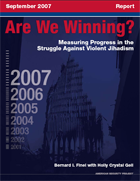Are We Winning? Measuring Progress in the Struggle Against Violent Jihadism (2007)

Since the terrorist attacks of September 11, 2001, U.S. foreign policy has focused largely on confronting the violent jihadist threat worldwide. There have been numerous successes and failures over the past six years in this so-called “war on terror.”
The American Security Project has developed ten criteria to measure progress – or lack of progress – in the struggle against violent jihadism. These metrics are designed to be both reproducible and as objective as possible. They are intended to comprise a holistic approach, examining causes and processes associated with violent jihadism, in addition to outcomes.
On balance, these metrics indicate that the United States is not winning the “war on terror.” The lack of measurable progress on most indices, the collapse of international public support for the United States, and the dramatic increase in jihadist violence since 2003 paint a bleak picture.
I. Number of Terrorist Incidents
There has been a massive and dramatic increase in Islamist terrorism since 2003. Terror attacks by Islamist extremist groups have increased significantly during this time, even when excluding attacks in Iraq, Afghanistan, and those related to the Israeli-Palestinian dispute.
II. Health of the Jihadist Movement
The jihadist movement remains vibrant and dynamic. Early claims about disruption of the al Qaeda network were dramatically overstated. Only five of the twenty-two most wanted terrorists in 2001 have been captured or killed. Though some high ranking al Qaeda members have been eliminated, the organization has been able to promote or recruit members to replace losses.
III. Al Qaeda Affiliated Movements
Al Qaeda has expanded its reach globally by forging closer relationships with previously autonomous groups.
IV. State Sponsorship of Terrorism
Active state sponsorship of terrorism has diminished worldwide
V. Public Attitudes in the Muslim World
U.S. foreign policy is perceived throughout the Muslim world as an aggressive, hostile and destabilizing force.
VI. Public Attitudes in the United States
American citizens remain very concerned about the terrorist threat. Significant numbers fear attacks on themselves or their family and friends. Increasing numbers of Americans believe the U.S. is losing the “war on terror.”
VII. Economic Prosperity and Political Freedom
Broad measures of economic prosperity and political freedom show slow but steady improvement throughout most of the Muslim world.
VIII. Ungoverned Spaces
There has been minimal progress on reducing ungoverned spaces. Iraq and Afghanistan are no longer state sponsors of terrorism, but vast ungoverned areas within both of those states make them homes to vibrant jihadist movements that are less vulnerable to traditional instruments of statecraft.
IX. International Cooperation Against Terrorists
The number of countries committed to combating terrorism has increased since 9/11.
X. Terrorist Financing
International cooperation has led to some successes in curtailing terrorist financing, but there is no clear evidence that Islamist terror groups are being starved of resources. Trends in Afghan poppy production suggest a disturbing new source of terrorist financing.





